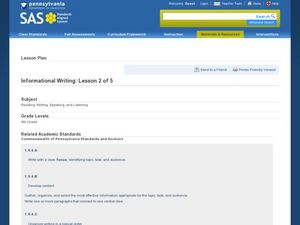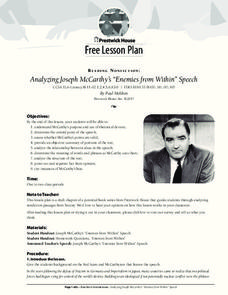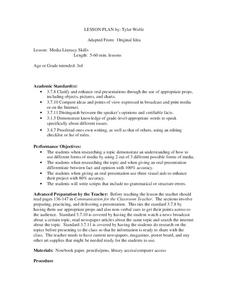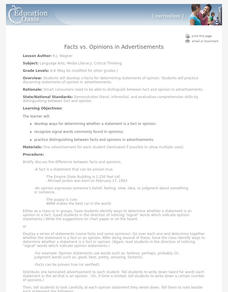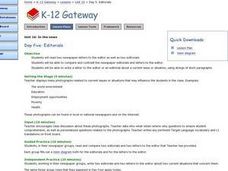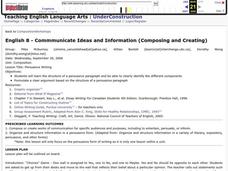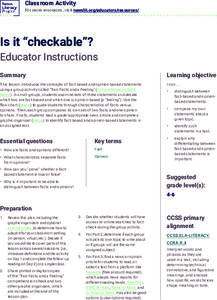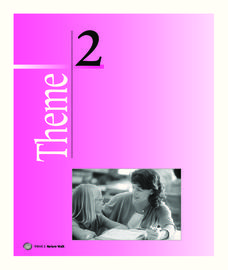Pennsylvania Department of Education
Informational Writing: Lesson 2 of 5
Introduce expository writing to your elementary learners. Young authors write a three-paragraph informational paper using the steps of the writing process. They follow guided lessons to experience each of five steps. Included are tons of...
Curated OER
Student Opinion: What Teacher Do You Appreciate?
This online resource is composed of a writing sample about teacher appreciation and a writing prompt for learners. You could use this as an in-class journal activity or you could have class members post their responses on the New York...
Curated OER
Checklist for Persuasive Writing
Provide third and fourth graders with a persuasive writing example and this checklist. Have learners read through the persuasive writing example to find the characteristics included in the checklist. Is the passage a good example?...
Curated OER
Determining Author's Point of View: The Sneeches
Determine the author's point of view in a text. Young readers read Dr. Seuss' The Sneeches and identify the author's purpose in the story. They identify persuasive techniques in writing, asking and answering questions to better...
Curated OER
Form an Opinion Based on Facts
Explore fact and opinion through higher level thinking and literacy. Kids listen to the beginning of A Picture Book of Helen Keller by David A. Adler and identify facts in the text. They follow along as the teacher models how to form an...
Curated OER
The Jacket: Journal Templates Teacher's Guide
Explore this story involving prejudice and racism to enhance learners' comprehension skills. The story The Jacket by Andrew Clements involves an African American boy who is falsely accused of stealing someone's jacket. This teacher's...
Curated OER
CHRISTMAS FILM REVIEW
Students write reviews of films they have seen over the Christmas holidays. They study what the ingredients of a film review are, and examine the difference between fact and opinion.
Curated OER
School Newspaper
Fifth graders run a school newspaper on a school website and discover how to use various literary forms as they relate to the writing process. In this school newspaper lesson, 5th graders synthesize information from different sources,...
Curated OER
Nonfiction Genre Mini-Unit: Persuasive Writing
Should primary graders have their own computers? Should animals be kept in captivity? Young writers learn how to develop and support a claim in this short unit on persuasive writing.
Prestwick House
Reading Nonfiction: Analyzing Joseph McCarthy's "Enemies from Within" Speech
Looking for a instructional activity that teaches class members how to analyze nonfiction? Use Joseph McCarthy's famous "Enemies from Within" speech as a instructional text. Worksheet questions direct readers' attention to the many...
Curated OER
Identifying Facts and Opinions
Students understand the difference between a fact and an opinion. They identify facts and opinions in a news report. They identify facts and opinions in print and color code them with different colors.
Curated OER
Is That a Fact?
Students write examples of facts and opinions on the board. In groups, they develop their own definitions for facts and opinions and share with the class. In new groups, they complete a worksheet in which they place statements into the...
Curated OER
Media Literacy Skills
You're on camera! Third graders find a news story and research it to get more information. Everyone uses their found information to write a script and create their own news broadcast!
San José State University
Writing Concisely: Deleting or Replacing Unnecessary Information
Are you actually feeling really tired of reading wordy, redundant, long, lengthy sentences practically all the time over and over again? Introduce writers to this handout and exercise to teach to tighten up their prose! Provides two ways...
Curated OER
Correcting Errors in Sentences
In this proofreading activity, students correct the grammar errors in three sentences. Students tell whether 4 sentences are facts or opinions. Students combine sentences and also write antonyms for 3 words.
Curated OER
Facts vs. Opinions in Ads
Students develop criteria for determining statements of opinion. They practice discerning statements of opinions in advertisements.
Curated OER
Fighting Fake News
Fake news. Alternative facts. Internet trolls. In an age of Newspeak, it's increasingly important to equip 21st century learners with the skills needed to determine the legitimacy of claims put forth on social media, in print, and in...
Curated OER
Editorials
Students investigate editorials. In this literacy critical thinking instructional activity, students compare and contrast two newspaper editorials and two letters to the editor by completing a Venn diagram. Students work in groups to...
Curated OER
Farming: It's a Fact
Understanding where our food and textiles come from is key to understanding business, economics, and the importance of modern agriculture. Learners play a game, read text to determine farm fact from opinion, and itemize a grocery receipt...
Curated OER
Fact and Opinion
In this writing activity, students identify and describe the difference between a fact and an opinion. They place the cut-up words from the house ad in the correct column to indicate if they are fact or opinion.
Curated OER
Persuasive Writing
Eighth graders study persuasive writing. They analzye an editorial for introductory,body, and concluding sentences. They develop arguments for and against various topics in small groups.
Madison Public Schools
Journalism
Whether you are teaching a newspaper unit in language arts, covering the First Amendment and censorship in social studies, or focusing on writing ethics in journalism, a unit based on the foundations of journalism would be an excellent...
News Literacy Project
Is It “Checkable”?
Upper elementary scholars test their checking skills with a lesson that challenges them to distinguish between fact and opinion. First, the class takes part in a discussion regarding a helpful flow chart. Next, learners follow the flow...
Houghton Mifflin Harcourt
Nature Walk: Extra Support Lessons (Theme 2)
Reinforce concepts such as long vowels, spelling patterns, sound clusters, double-final consonants, and syllables with a nature-themed unit. Through a series of extra support lessons, learners compare and contrast using a Venn diagram,...


